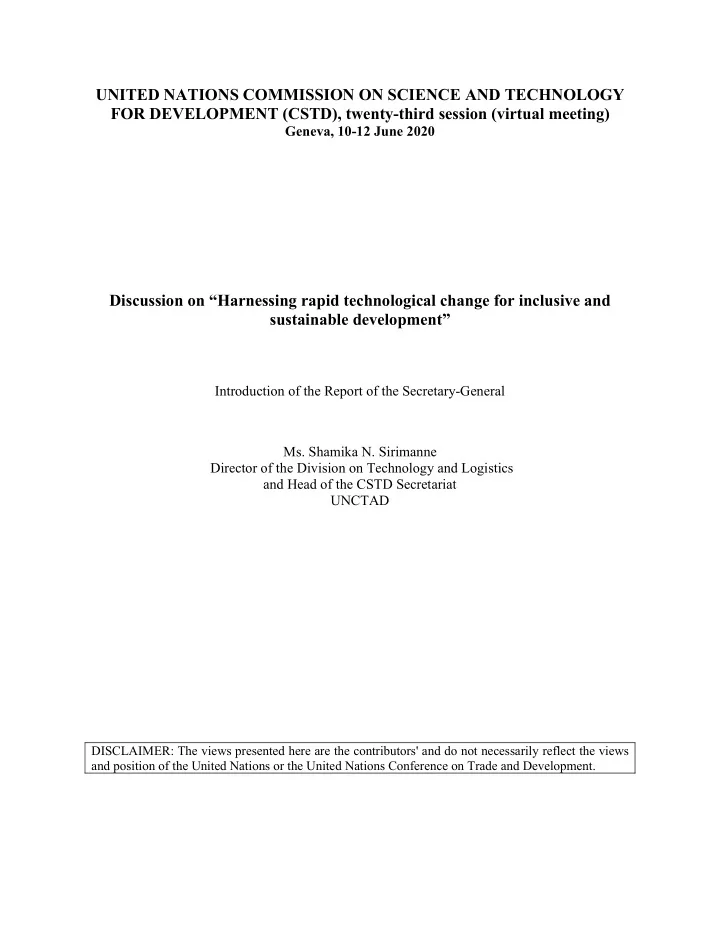

UNITED NATIONS COMMISSION ON SCIENCE AND TECHNOLOGY FOR DEVELOPMENT (CSTD), twenty-third session (virtual meeting) Geneva, 10-12 June 2020 Discussion on “Harnessing rapid technological change for inclusive and sustainable development” Introduction of the Report of the Secretary-General Ms. Shamika N. Sirimanne Director of the Division on Technology and Logistics and Head of the CSTD Secretariat UNCTAD DISCLAIMER: The views presented here are the contributors' and do not necessarily reflect the views and position of the United Nations or the United Nations Conference on Trade and Development.
Harnessing Rapid Technological Change for Inclusive and Sustainable Development ---- Shamika N. Sirimanne UNCTAD Director, Division on Technology and Logistics Head of the CSTD Secretariat Thursday 11 June 2020 2:00PM Excellencies, Distinguished Delegates, Ladies and Gentlemen. I am honored to present the Report of the Secretary-General under this agenda item. We received many valuable contributions, good practices and lessons from 19 member States and international agencies. These are reflected in the SG's report and available at the CSTD web site. The CSTD has consistently emphasized that technological change is essential for economic growth and sustainable development. In these challenging times we have seen many examples of how frontier technologies are being harnessed to address the COVID-19 pandemic. Policy directionality SG’s report emphasizes the need for guiding rapid technological change towards an inclusive and sustainable future. ➢ We need breakthrough innovations designed specifically to address the SDGs. However, our analysis of national strategies on frontier technologies shows that they rarely focus on sustainable development. ➢ Mission-oriented approaches are a practical way to provide directionality to innovation activities. The Global Alliance for Vaccines and Immunization (GAVI) is a good example. 1
➢ Setting priorities and defining appropriate missions is vital. This remain challenging for policy makers, especially for versatile technologies that could affect many Goals. Unintended consequences The Report of the Secretary General discusses five different channels through which rapid technological change can result in unintended consequences: ➢ First, automation and digitalization can have positive returns for people with the right skills, but the net effect on employment remains unclear. ➢ Second, the winner-takes-all nature of digital technologies can increase inequality through market concentration, as UNCTAD’s Digital Economy Report 2019 presents in detail. ➢ Third, the design of technology and how it is used can perpetuate inequalities. For example, if AI uses biased data to learn how to make decisions it can replicate old causes of inequalities such as gender and racial discrimination. ➢ Fourth, unequal access to essential technological infrastructure, lack of affordability, and disparities in skills create wider inequalities. Almost half of the population of the world remains offline and, consequently, out of reach of digitally enabled innovations. ➢ And fifth, frontier technologies may increase the technological gap between countries. This is because technologies are applied first and more intensely in industries, services and segments of value chains in which more industrialized economies have a comparative advantage Ladies and gentlemen, Shaping rapid technological change The Report looks at four priority areas for governments to shape rapid technological change: ➢ First, policies to create an enabling environment for frontier technologies, including infrastructure, and low-cost technology-based services. 2
➢ Second, skills development for innovation. Frontier technologies require literacy and digital skills as well as entrepreneurship training that can support the adaptation of new technologies. ➢ Third, scaling up businesses through improved policies for financing, better collaboration between researchers and the private sector, and wider dissemination of successful innovations. ➢ And fourth, employing technological foresight to better understand the technological paths and potential long-term social, economic and environmental impacts. On that note, I am pleased to announce that UNCTAD will soon launch a project to support technology assessment in developing countries to accelerate progress towards the SDGs. Ladies and gentlemen, The Report highlights international collaboration in research cooperation, capacity building and official development assistance which are all critical to ensure that emerging technologies are developed with inclusiveness and sustainability in mind. However, in 2017, less than 4% the official development assistance (ODA) commitments to developing countries were reported in STI sectors. The levels of ODA must surely increase to build the critical STI capacities. I would like to conclude with one observation: While the impact of frontier technologies will be felt by all, not all of us are participating equally in defining the path these frontier technologies will follow. We need a global, inclusive dialogue about all aspects of fast technological change and its impact on society, including its normative dimension. Thank you. 3
Recommend
More recommend